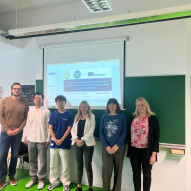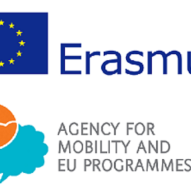ERASMUS+ KA171: New Insights from the project
In a recent joint study published in Computers and Electronics in Agriculture (ScienceDirect), we explored how artificial intelligence and flexible pressure-sensor arrays can transform smart animal husbandry by enabling accurate, real-time monitoring of animal–environment interactions.
Our work focuses on next-generation flexible sensor arrays combined with AI models to capture subtle pressure signals generated by animal movement, posture, and contact behaviors, and to translate them into meaningful indicators of health and welfare.
We investigated three main aspects:
-
Response characteristics of flexible pressure sensor arrays under realistic farming conditions.
-
Optimization strategies for sensor structure, materials, and signal processing using AI-driven methods.
-
Innovative applications in intelligent livestock management, including behavior recognition and early anomaly detection.
Key Findings
-
Flexible pressure sensor arrays demonstrate high sensitivity, mechanical robustness, and stable performance suitable for long-term deployment in agricultural environments.
-
AI-based optimization significantly improves signal accuracy and noise resistance, enabling reliable interpretation of complex pressure patterns.
-
The proposed system supports non-invasive, continuous monitoring, offering a practical pathway toward precision livestock farming and improved animal welfare.
The study is available here: https://doi.org/10.1016/j.compag.2025.110988
Read MoreERASMUS+ KA171: New Insights from the project
In a recent study published in ACS Applied Materials & Interfaces, we addressed a key challenge in agricultural robotics: how to gently and accurately assess fruit ripeness and size during automated harvesting and handling.
We developed a robotic manipulator equipped with integrated flexible tactile sensing arrays, designed to capture detailed contact information while interacting with delicate kiwifruit.
Our approach combines:
-
A soft, sensorized gripper structure for safe physical interaction.
-
High-resolution flexible tactile sensor arrays to measure pressure distribution and surface features.
-
Data-driven classification models for ripeness and size estimation.
Key Findings
-
The integrated tactile arrays provide precise, repeatable measurements without damaging the fruit.
-
Pressure-pattern features enable reliable classification of both ripeness stages and fruit size.
-
The proposed manipulator demonstrates strong potential for deployment in automated sorting, harvesting, and quality-control systems.
This work contributes to safer human-robot interaction in agriculture and to more efficient, quality-aware fruit handling.
The study is available here: https://doi.org/10.1021/acsami.4c12158
Read MoreERASMUS+ KA171: Workshop on advanced ICT for the agri-food industry
PhD students Sun Yun and Kong Chuiyu under the supervision of the host mentor, associate professor Marija Brkić Bakarić, and other members of the Lab for Data Engineering and Computational Linguistics of the Faculty of Informatics and Digital Technologies professor Maja Matetić, associate professor Vanja Slavuj, PhD student Dejan Ljubobratović, and head of the lab, associate professor Lucia Načinović Prskalo participated in a workshop on advanced ICT for the agri-food industry that tackled:
- AI and data-driven solutions for sustainable agriculture
- Computational models for agri-environmental data analysis
- Smart applications and ICT tools supporting food systems
The workshop enabled participants to explore cutting-edge technologies shaping the future of food production and supply chains.
Read MoreErasmus+ KA171: Research and collaboration in action
Two PhD students from the China Agricultural University visited Lab for Data Engineering and Computational Linguistics of the Faculty of Informatics and Digital Technologies in the period from April 1 to May 31, 2025. Along with the lab members they coninued working on joint research studies and on technology development. Presentations of the conducted research will be organized at 10:00 am on May 22, 2025 in room No 357. The workshop is open to all interested parties.
Read More
Erasmus+ KA171: Round table
Obranjen doktorski rad
U ponedjeljak, 28. travnja 2025. u 12 sati Ive Botunac je obranio doktorski rad SUSTAV ZA AUTOMATSKO TRGOVANJE DIONICAMA NA TRŽIŠTU KAPITALA
TEMELJEN NA DUBOKOM PODRŽANOM UČENJU. Rad je izrađen pod mentorstvom prof. dr. sc. Maje Matetić, a obranjen je pred povjerenstvom za ocjenu i obranu doktorskog rada u sastavu prof. dr. sc. Ivo Ipšić, prof. dr. sc. Sanja Seljan i izv. prof. dr. sc. Marija Brkić Bakarić. Čestitke Ivi i mentorici na izvanrednim postignućima!
Read More


